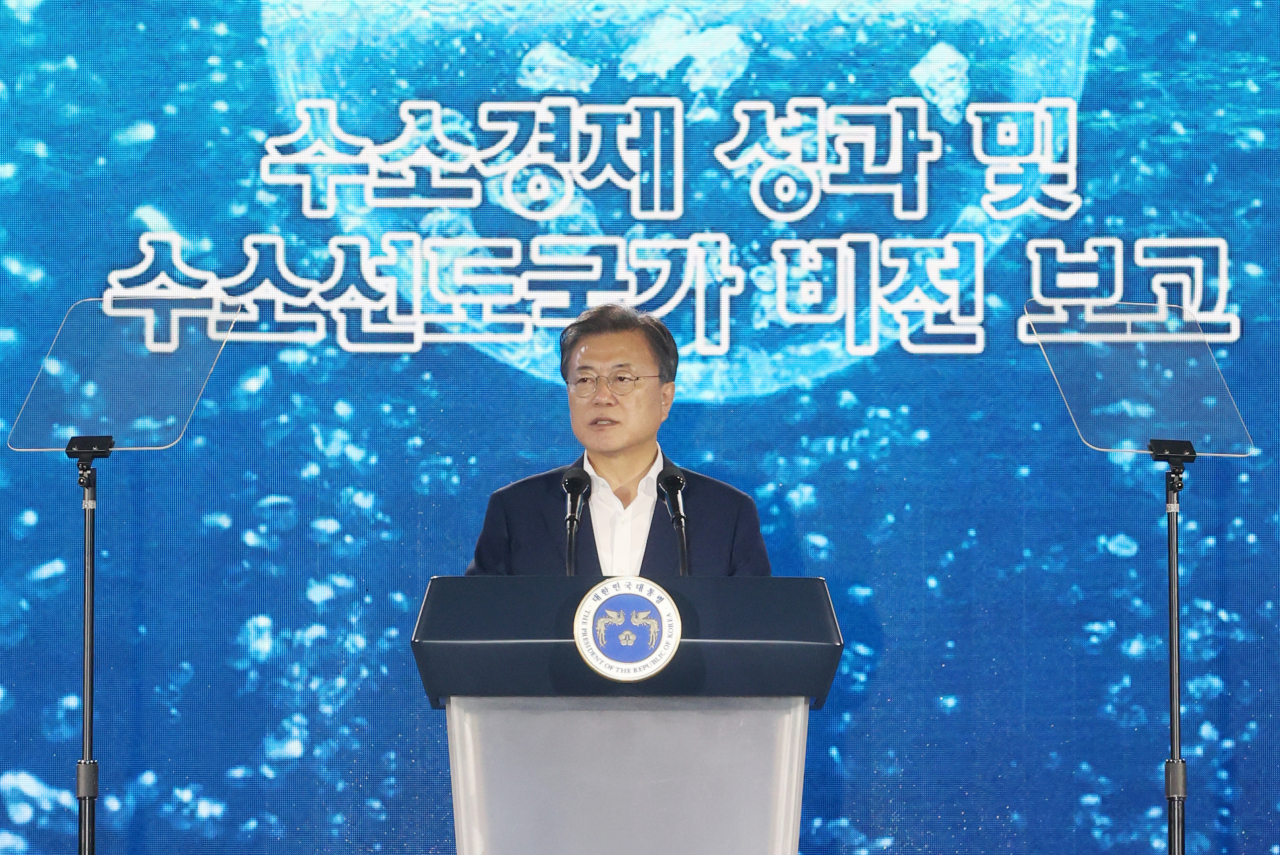State spending on strategic industries to surge 43% next year
 |
|
South Korean President Moon Jae-in speaks at a briefing session on hydrogen economy at the Industrial Complex in Cheongna International City, Incheon. (Yonhap)
|
South Korean President Moon Jae-in reiterated the country’s commitment to the hydrogen economy, while meeting government and industry officials Thursday.
Attending a briefing session on the progress of the country’s hydrogen programs, he also encouraged chiefs of major conglomerates, including Hyundai Motor Group and SK Group, in attendance to continue their effort for building a hydrogen ecosystem.
“A hydrogen economy is one of the core areas the government is working on for the economic future of the country, and leading conglomerates here are making large-scale investments and cooperating with each other to foster the industry,” Moon said at the event, held at the industrial complex in Cheongna International City of Incheon.
“South Korea, with its world-class level capability in hydrogen technology, can become the leader for the new energy source. We will not hesitate in its pioneering journey as we see infinite potential in hydrogen.”
Some 70 government officials and company executives attended, including Minister of Economy and Finance Hong Nam-ki and Minister of Trade, Industry and Energy Moon Sung-wook.
The event was a follow-up to the country’s road map for the hydrogen economy that was announced in January 2019, which envisions some 6.2 million hydrogen fuel cell electric vehicles on the road by 2040. It also includes a plan to raise the production capacity of green hydrogen to some 5.26 million tons.
According to the Industry Ministry’s briefing, South Korea was the first in the world to establish a hydrogen law, designed specifically to support development of the hydrogen economy ecosystem. The country also came up with policy guidelines in six areas — including R&D, infrastructure, hydrogen-powered cars and charging systems after the introduction of the road map — and launched a governmental hydrogen committee.
With systematic support, South Korea has made great progress to lead the global hydrogen industry, the ministry said.
As of August, South Korea had sold the most hydrogen fuel cell electric vehicles — 16,381 — globally, trailed by the United States with 11,024 and Japan with 6,342.
It has also implemented 112 hydrogen charging stations as of August. While the figure places the country second after Japan’s 152 hydrogen stations, Korea still has the fastest installation rate, as the number grew by 700 percent from 2018, according to the Industry Ministry.
With efforts from both the public and private sectors, the local hydrogen market is diversifying to add new forms of mobility, such as hydrogen trams, freight trucks, garbage trucks and forklifts.
The market has also been witnessing steady growth, with sales increasing by 13 percent and investment by 60 percent in the past three years, the ministry data showed.
At the briefing, President Moon also met with chiefs of major conglomerates, including Hyundai Motor Group Chairman Chung Euisun, SK Group Chairman Chey Tae-won, GS Energy Chief Executive Officer Huh Yong-soo, Hyundai Heavy Industries Vice President Chung Ki-sun and E1 Chief Operating Officer Koo Dong-hui.
Last month, the conglomerate chiefs gathered to launch the Korea H2 Business Summit, a local equivalent to the global CEO-led initiative of the Hydrogen Council, consisting of 15 founding members.
On the sidelines of the event, the state chief also took part in the groundbreaking ceremony for Hyundai Mobis’ fuel cell plant, planned at the industrial complex.
The plant in Incheon is one of the two production facilities the company will build with funding of 1.3 trillion won ($1.09 billion) to produce 100,000 hydrogen fuel cells annually. The other plant is to be established in the southeastern city of Ulsan. Both are expected to go into operation in the second half of 2023, according to Hyundai Mobis, an affiliate of Hyundai Motor.
Hyundai Mobis CEO Cho Sung-hwan vowed to “secure the market-leading competitiveness in the global fuel cell industry” with the expansion in production capacity.
“We will continue to invest more in facilities and strengthen our R&D capability for the development of the hydrogen industry and expand the ecosystem,” Cho said.
With the planned new facilities, Hyundai Mobis will be operating three fuel cell plants.
In 2018, the company set up the world’s first complete production system in Chungju, North Chungcheong Province, which produces fuel cell stacks and the remaining electronic components.
From electric vehicles to construction machinery and logistics equipment, Hyundai Mobis plans to expand its lineup for products that apply to fuel cell systems and to diversify its hydrogen business, it said.
By Jo He-rim, Hong Yoo (herim@heraldcorp.com) (yoohong@heraldcorp.com)
